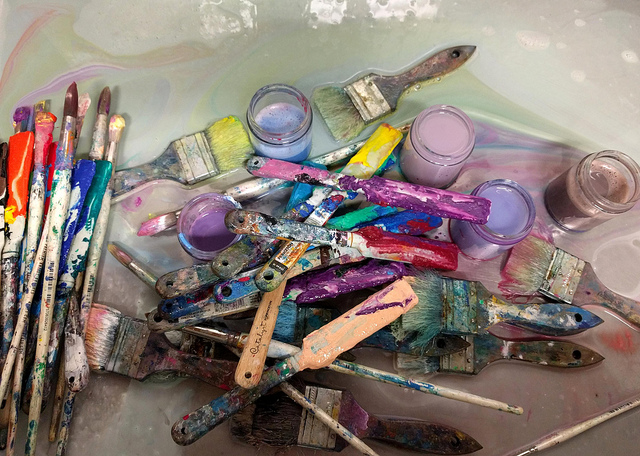When I was in high school, I would not have defined myself as very good at school.
I mean, I did alright. I passed all my classes, and I did so with mostly B’s and (depending on the course) C’s. But I wasn’t what you would call a perfect student, by any stretch of the imagination.
I dropped math the moment I could, because it became abundantly clear to me that I was making absolutely no progress in it. My science teacher hated me, proven by the fact that she spoke to me as though I fit into the dumb-blonde stereotype. And when I tried to continue studying French, my teacher gave me a look of surprise, as though she honestly didn’t understand why I even bothered anymore.
None of this would have bothered me as much as it did if it weren’t for the fact that I was friends with all of the smart kids in high school. The kids who were looking forward to careers in science. The kids who all the teachers knew and loved.
Once, one of my closest friends in high school told me that he loved math, and I was baffled as to how that was even possible.
“Because, it’s structured,” he said. “It’s always the same. There’s always a right answer.”
“Then what’s the fun?” I wondered.
And as much as this might give the impression that I was terrible in school, I really wasn’t. I just hadn’t focused on the right subjects yet.
I got straight A’s throughout all four years of English, and I received high praises on all of my English projects because they were creative and “thought-provoking.”
I loved photography, although everyone laughed when I told them—and they accused me of taking it because it was a “skip class.” And some of my absolute favourite memories from high school took place in my drama class.
These were the places where I thrived. These were the places where I felt not only skilled, but intelligent.
From high school, I went on to university—taking on a major in English—and I don’t think that it’s dishonest to say that I thrived there. I did so well that one of my professors encouraged me to continue on and pursue a graduate degree.
But here’s the thing: I still can’t do even the most basic math. I can tell you all about the metaphors in The Great Gatsby, but I can’t tell you what 40 percent of anything is.
I can list off the greatest and most influential science-fiction writers, but the closest I ever came to failing a class was in astronomy. Meanwhile, that boy who told me that he loved math because there was always a right answer cannot write an essay about literature to save his life.
There are some who will say that between me and the boy, one of us has a set of skills that will be much more helpful in life than the other. However, I think that both sets of skills are necessary.
That boy has the ability to do his taxes well and to calculate numbers quickly—and I have the ability to write stories and communicate ideas clearly. They are different skills, certainly, but they both have their place in the world. And they both stem from different types of intellect.
Everyone has a different sort of intellect—their own unique sort. You might be able to excel in gym, but you cannot write an essay. Maybe you are good with machinery, but you are terrible at music.
It doesn’t matter—it is all amazing, and it is all useful, in one way or another.
And the problem with our education system, as it is set up right now, is that students are expected to excel in very specific environments—when not everyone can. This is especially difficult for students who are not particularly skilled in the areas that school encourages—math, science, gym, and so on.
Students who are more artistically inclined—the musicians, the painters, the artists—sort of fall to the side, neglected by a system that tells them that they are stupid because they cannot add or subtract or multiply.
And sometimes, this message can get into kids’ heads, making them feel like they really are stupid. It certainly did for me—I quickly grew to hate math and science, because my teachers regularly made me feel like I couldn’t do anything—like I was limited somehow.
It was the other subjects, the ones that I was good at, that proved them wrong. I wasn’t stupid because I couldn’t do what they asked—I was just skilled in other departments.
And you are not stupid because you can’t do some specific thing. We all have our strengths, and we all have our weaknesses—and the problem with the education system is that it expects all of us to be strong in the same departments.
It does not provide opportunities for kids who are better in the arts to develop their abilities—and in that regard, the system is the one that fails us, not the other way around.
.
Relephant:
The Benefit of Art in Education.
How STEM Education Might Be Harming U.S. Children.
Why we Must Act Now to Defend the Arts, CPB & NPR against Trump.
~
Author: Ciara Hall
Image: Flickr/Anders Ruff; Flickr/Ruth Hartnup
Editor: Yoli Ramazzina












Read 3 comments and reply